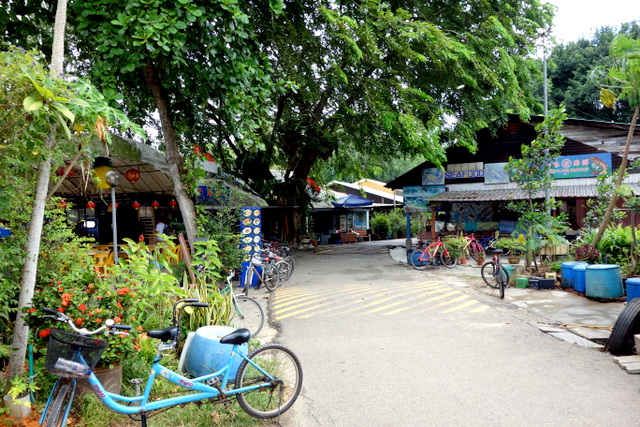It has probably been more than a decade since I last visited Pulau Ubin.
Even though I stay in the east, reaching Changi Point Ferry Terminal (not to be mistaken with Changi Ferry Terminal) took me more than an hour by public transport. Once we reached the terminal, we were quickly herded onto the boat to fill the boat's capacity of 12.
The ride only cost Sin$2.50 one way and within 10 minutes, we reached Pualu Ubin.
Pulau Ubin means "Granite Island" in Malay, and indeed, you will get to see a few abandoned quarries.
The first thing we needed to do upon arrival was to rent a bicycle from one of the friendly stallholders. We each rented a bicycle for $8 (for the entire day), which is very cheap compared to what you have at for example, East Coast Park. The shop that we went to also operated on the basis of trust- no identification cards needed. Granted, the quality of the bicycles weren't great and were in fact rather worn. However, it served our purpose that day and that was all that mattered.
I do not usually cycle on roads but it is relatively safe cycling on the island- there isn't much traffic on the roads (minus the police land rover that is constantly driving around the island).
As usual, being the lazy planners that we are, the strategy that we usually adopt (whether in Singapore or overseas) is to reach the place, get a map and start exploring from there, without any inkling of what we should be looking out for.
One of our first stops was the
Butterfly Hill. A sanctuary for over 80 species of butterflies, it was my first time seeing such big butterflies and butterflies were just dancing from one flower to the next.
The signs around Pulau Ubin were clear and you did not need to worry that you would get lost. 3G signal was non-existent at some parts of the island.
As we cycled around the island, it was as though we had stepped back in time and saw how Singaporeans used to live.
Getting to
Chek Jawa Wetlands by bicycle wasn't the easiest thing for a recreational cyclist like me. To get there, we had to cycle through mud trails. As there were plenty of slopes (steep ones at that), I decided to dismount and push my bicycle up and down the slopes.
Public service announcement: If you are not used to riding on steep slopes, please do yourself a favour and do not ride recklessly down these slopes. There have been
many accidents due to cyclists riding down these slopes and you do not want a fun day out to end up as a tragedy.
Bicycles were not allowed in Chek Jawa, so we left our bicycles at the bicycle rack outside. Upon entering Chek Jawa, we saw a small crowd and noticed that they were all looking in the same direction- wild boars! Parading down the tracks like divas, the wild boars were not concerned about the people standing around. Wild boars will only attack if they are cornered or if they feel threatened.
We ventured further in and ended at
House No. 1. Built in the 1930s as a holiday retreat, the architecture of the building is in Tudor-style.
Later, we venture onto the boardwalk. It was high tide by then and we did not get to see much of the wildlife. If you want to walk on the shore and not the boardwalk, you have to sign up for the special guided walks by NParks. This measure is necessary to minimise impact on the biodiversity system.
As we left Chek Jawa and cycled back to our starting point (we were famished by then), we came across this beautiful quarry. Of all the quarries that we came across, this particular quarry had waters in a beautiful shade of blue-turquoise, unlike anything we had seen previously. This might be the
Balai Quarry, although I can't be sure.
Nearly reaching the starting point, we saw the
Ubin Sensory Trail. This trail was developed in 1995 to allow the visually handicapped a chance to experience Pulau Ubin using their sense of touch and smell.
We then saw a lotus pond against a background of coconut trees- the cloudy skies had given way to blue skies and it was a good closing to a morning exploring this island (while burning calories).
It is easy to get caught up with city life where the comforts of modern life are easily available. However, it's nice to enjoy a slice of kampong life once in a while and immerse yourself in the raw, untouched beauty of nature.


































.jpg)



